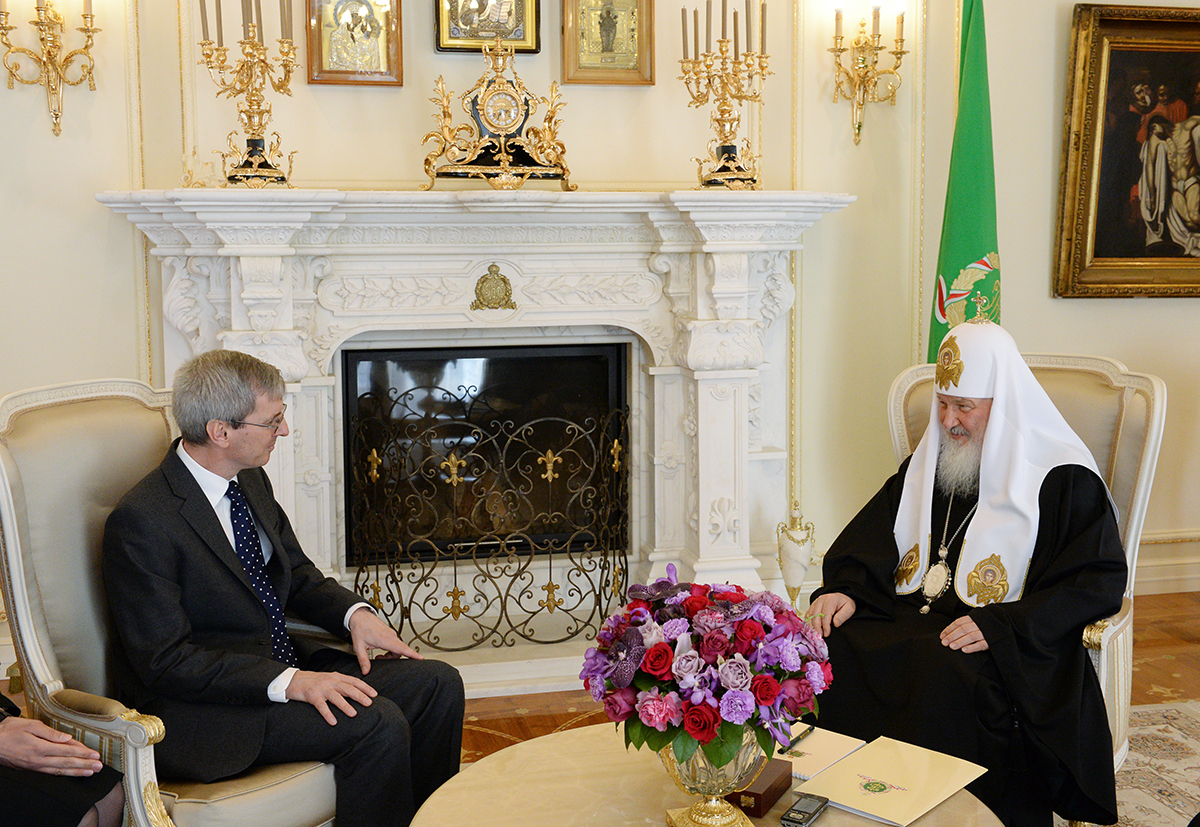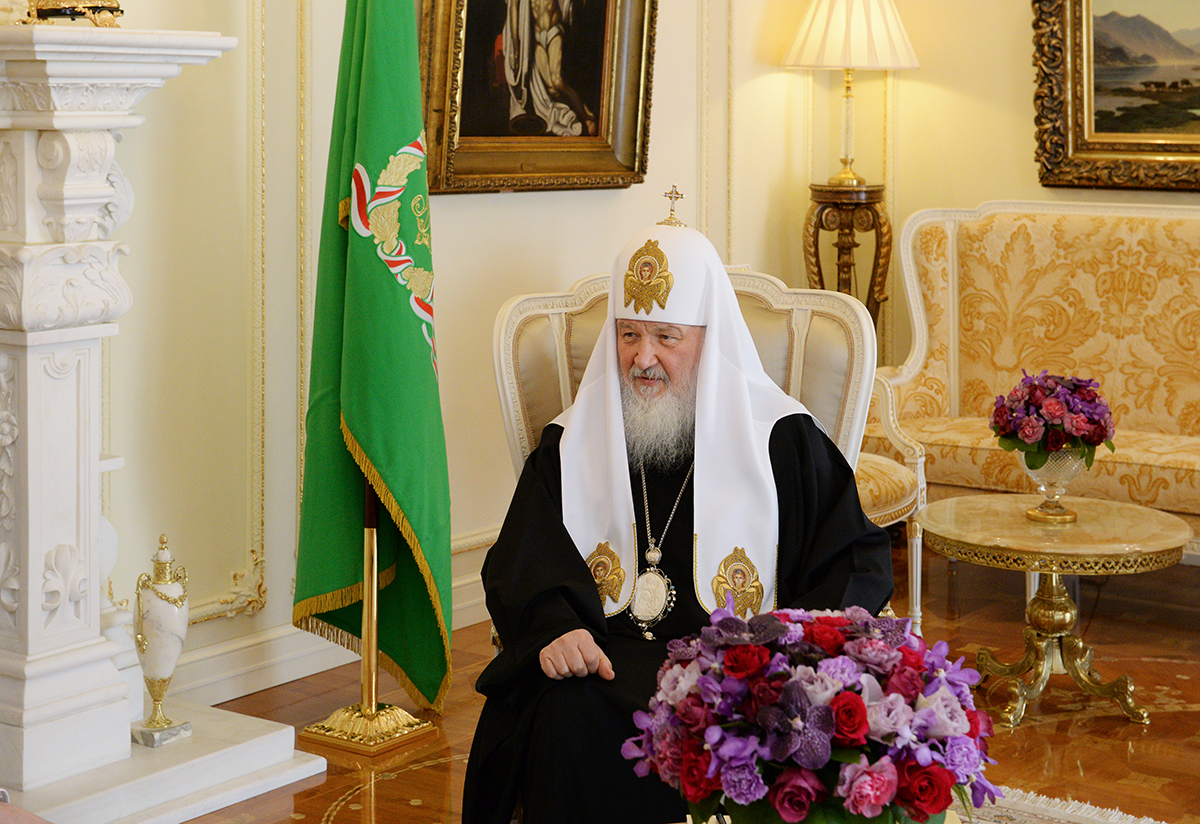Patriarch Kirill meets with British Ambassador to Russia Dr. Laurie Bristow



On April 5, 2016, His Holiness Kirill, Patriarch of Moscow and All Russia, met with Great Britain’s Ambassador to Russia Dr. Laurie Bristow, at the patriarchal and synodal residence in the St. Daniel Monastery.
The meeting was also attended by Mr. Martin Harris, Minister and Deputy Head of Mission to Russia, and Mr. Jonathan Evans, fist secretary of the British Embassy. The Russian side was represented by Archimandrite Philaret (Bulekov), vice-chaired of the Moscow Patriarchate department for external church relations (DECR), and Archpriest Sergiy Zvonarev, DECR secretary for the far abroad.
The Primate of the Russian Orthodox congratulated Dr. Bristow on his appointment as head of the British Embassy in Moscow.
Patriarch Kirill said that the tradition of the Russian Orthodox Church’s good relations with the Church of England, which traces back to the 16th century, is an important factor determining her attitude to Britain and the British people. The inter-church contacts were especially intensive in the late 19th century and the early 20th century, but even in the difficult Soviet time the relations were not interrupted. Thus, during World War II, in 1943, Archbishop Cyril Garbett of York came flying to Moscow, and in the post-war time Patriarch Alexis I visited Great Britain.
‘Since that time we have had fairly intensive bilateral relations and they are developing at present’, His Holiness said, stressing that the Russian Orthodox Church welcomes the stand taken by the Anglican Church on issues concerning the Christians understanding of marriage. ‘This January, Archbishop Jastin Webly of Canterbury held a meeting of the primates of the Anglican Church, which clearly stated the position of the Anglican community on this issue, which is close to that of the Russian Orthodox Church. It creates a condition for continuing our cooperation. I hope that it will continue to develop, benefiting the Russian-British relations as well’.
His Holiness also mentioned concrete problems as important for Christians to solve together. In the first place, it is the concern for protecting Christian communities subjected to persecution. ‘The developments taking place today in the Middle East, North Africa, Pakistan, Nigeria and a number of other countries testify to the terrible oppression of Christians – more terrible then in the Roman Empire, more terrible then in the Soviet Union. Every five minutes, according to the OSCE, one Christian is killed. I was struck by the news about the monstrous crime committed quite recently in Pakistan where a priest was crucified on Easter day. We also know that Christians are killed by whole villages’, he noted.
His Holiness mentioned that in 2002, when he was on a visit to Iraq, the Christian community in the country amounted to a million and a half people. Now there are only 150 thousand Christians left. In 2011, when hostilities began in Syria, Patriarch Kirill visited the country to meet with Christian leaders there. There were 1 million 500 thousand Christians living there at that time. Now there are only 500 thousand left. In addition, the extremists destroyed a great number of churches. As far as Libya is concerned, one can say that the Christian community there was exterminated.
To save Christians subjected to persecution and physical exterminations, both religious leaders and politicians should take action together, His Holiness said, noting that the problem of protection of persecuted Christians was the main topic of discussion during his meeting with Pope Francis of Rome, which took place in February.
Patriarch Kirill also stated that the oppression of people who confess Christianity could be also seen in a number of well-to-do countries. ‘It is maintained that there should be no visible signs of one’s belonging to a Christian Church, in the name of tolerance’, he noted, ‘We believe that Christians have the same rights as people of any other religion, especially in Europe which is founded on Christianity, however she may understand herself today. It is a Christian civilization, which subsequently, especially in the recent times, stopped regarding itself as Christian. But it is my profound conviction that it remains such. Therefore, any oppression of Christians for the outer expression of their belonging to the Christian Church is certainly upsetting. We believe that Christians have the same rights as the rest and by no means should be discriminated to please some other religious communities.’
In his talk with the ambassador of Great Britain, Patriarch Kirill drew his attention to the fact that there is the Russian Orthodox Church diocese of Sourozh existing there since 1962. By the number of parishes and the faithful it is the second largest diocese among the dioceses of various Orthodox jurisdictions after those of the Patriarchate of Constantinople.
‘And on the whole, the Russian Orthodoxy in Great Britain is 300 years this year’, His Holiness said, adding, ‘The first church was opened in 1716 by a decree of Emperor Peter I. Its first parishioners were Russian students, who were had been sent by Peter II to Great Britain to study. Later they were joined by Greeks and people of other nationalities. We count the history of Russian Orthodoxy in your country from that year’.
‘Thank you very much, Your Holiness, that you have found time to meet me today’, Dr. Laurie Bristow said in his turn, stressing that the significant 300th anniversary of the Russian Orthodox Church in Great Britain celebrated this year is also a very important proof the long and rich history of Russian-British relations. Actually, he said, this history is much longer than three hundred years because the first ambassador of Great Britain was appointed to Russia 450 years ago. He also said that the Russian community in Great Britain and the British people who reside in the Russian Federation are of great importance for developing relations between the two nations.
The ambassador pointed to the historic significance of the meeting in Cuba between Patriarch Kirill of Moscow and All Russia and Pope Francis of Rome and to the good relations between the Anglican Church and the Russian Orthodox Church.
Speaking about the hard fate of Christian communities in the countries in which they are persecuted, Dr. Bristow stressed the importance of inter-confessional dialogue concerning the help to be given to persecuted Christians.
Speaking about the situation in European countries, the guest expressed the conviction that people of various religious beliefs need to have an opportunity to confess their religion peacefully and according to state laws.
In conclusion of the meeting, Patriarch Kirill presented Ambassador Laurie Bristow and those who accompanied him with tokens of the meeting.
DECR Communication Service
